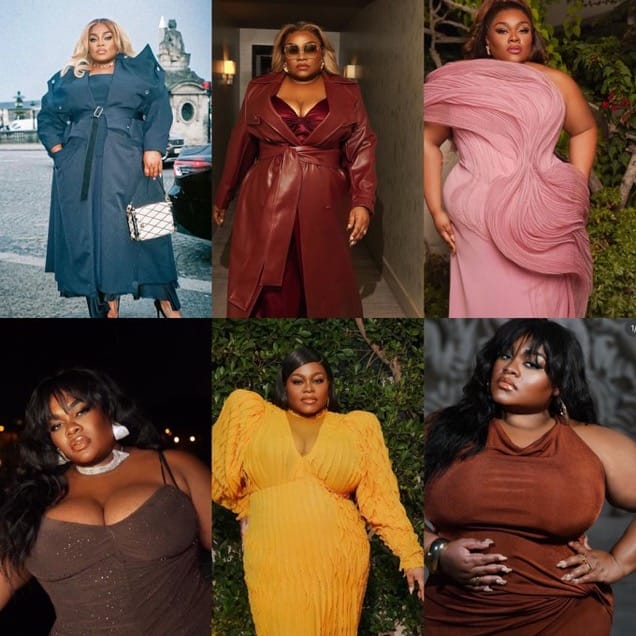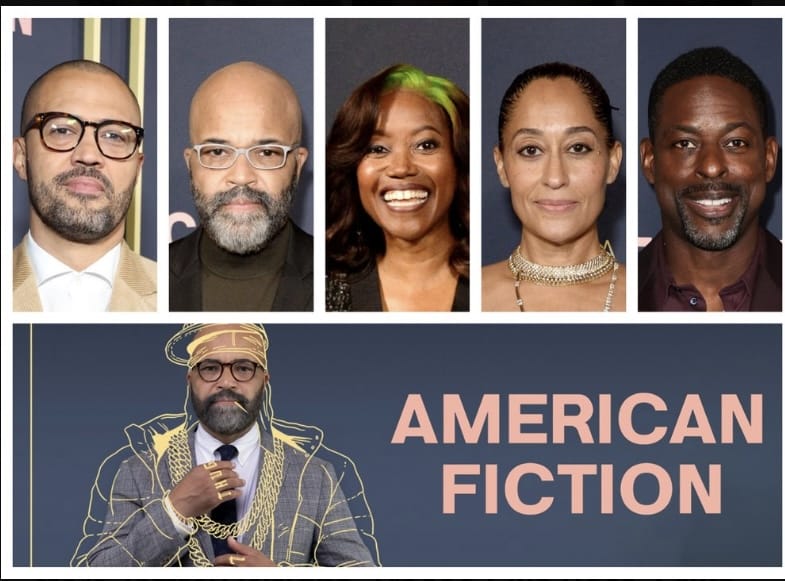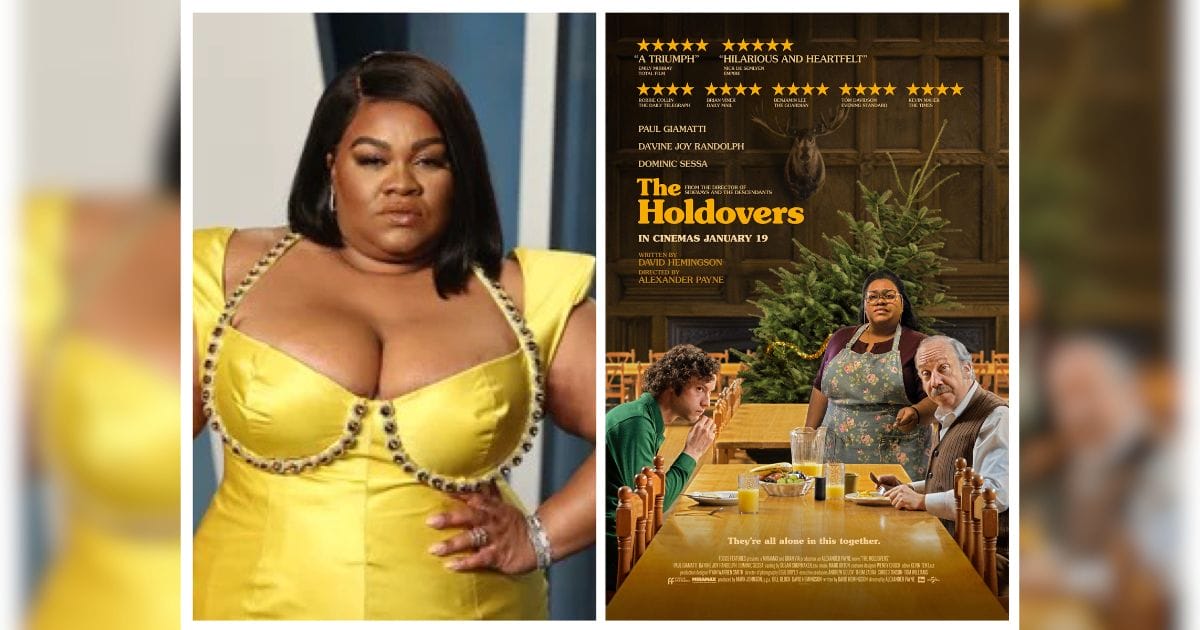DA’VINE JOY RANDOLPH and poster art from “The Holdovers,” with Dominic Sessa and Paul Giamatti.
“American Fiction’s” Cord Jefferson also delivers industry shattering speech
Da’Vine Joy Randolph won the Best Supporting Actress Oscar for her role as Mary Lamb in the film “The Holdovers.”
According to Entertainment News, Randolph is the “11th Black woman to win an Academy Award for Best Supporting Actress, following in the footsteps of other greats such as Hattie McDaniel (“Gone with the Wind”), Whoopi Goldberg (“Ghost”), Jennifer Hudson (“Dreamgirls”), Mo’Nique (“Precious”), Octavia Spencer (“The Help”), Lupita Nyong’o (“12 Years a Slave”), Viola Davis (“Fences”), Regina King (“If Beale Street Could Talk”) and Ariana DeBose (“West Side Story”).
Halle Berry is the only Black actress to win a Best Actress Oscar for her work in “Monster’s Ball.”
These are pitiful statistics, considering McDaniel won her Oscar in 1940, more than 80 years ago.
“The Holdovers” is described briefly: A curmudgeonly instructor at a New England prep school remains on campus during Christmas break to babysit a handful of students with nowhere to go. He soon forms an unlikely bond with a brainy but damaged troublemaker, and with the school’s head cook, a woman who just lost a son in the Vietnam War.
Randolph plays Mary, the cook. Her role takes on more than as a grieving mom and a subservient figure. She is compassionate and inspirational for the student body—a pivotal scene shows Mary having an emotional breakdown at a holiday party, where she swears off everyone. She is still very much in mourning.
She’s gentle when she needs to be and a brash user of alcohol whenever she is so inclined.

She plays alongside Professor Paul Hunham, played by Paul Giamatti, and student Angus Tully, played by Dominic Sessa.
Randolph is a Yale School of Drama graduate and has swept this awards season with this win and a Golden Globe, Critics’ Choice Award, BAFTA, and SAG Award, among others. In my opinion, she deserves so much more!
Nyong’o praised Randolph onstage ahead of her big win, which brought the actress to tears.
During her tearful acceptance speech, Randolph said: “God is so good, while praising her mother for encouraging her to act when she initially just wanted to sing. For so long I’ve always wanted to be different. And now I realize, I just need to be myself. And I thank you, I thank you for seeing me.”
Randolph went on to thank other people, including an inspirational acting teacher: “When I was the only Black girl in that class, when you saw me and you told me I was enough. When I told you, ‘I don’t see myself,’ you said, ‘That’s fine. We’re going to forge our own path. You’re going to lay a trail for yourself.'”
She added, “I am so grateful to all the women who have been by my side.”
She had said before the ceremonies that an award is fine, but “I want a career, I want to create a legacy, I want to be booked for five years in advance with strong pieces not fighting for scraps.”
Randolph has also played in “Rustin,” “Dolemite is My Name” and “The United States vs. Billie Holiday,” among others.
All in all, the event was still #OscarsSoWhite, a hashtag created by social media influencer April Reign in 2015.
“American Fiction” stars Jeffrey Wright, Leslie Uggams, Tracee Ellis Ross, Erika Alexander and Sterling K. Brown. Wright plays Thelonious “Monk” Ellison, a frustrated novelist who’s fed up with the establishment that profits from Black entertainment that relies on tired and offensive tropes. To prove his point, he uses a pen name to write an outlandish Black book of his own, a book that propels him to the heart of hypocrisy and the madness he claims to disdain.

In other words, Thelonious writes so well that he has to adapt a “ghetto” personality to keep the ruse going, thereby selling more books and supporting his mom’s (Uggams) assisted living stay.
In his speech after winning the Best Adapted Screenplay for “American Fiction,” Jefferson put out a clarion call to Hollywood. “I understand that this is a risk-averse industry, I get it,” said the writer and director. “But $200 million movies are also a risk… but you take the risk anyway.”
He added: “I’ve been talking a lot about how many people passed on this movie, and I worry that sometimes sounds vindictive. I don’t want to be vindictive, I’m not a vindictive person anymore, and I’ve worked very hard to not be vindictive anymore,” he said. “It’s more a plea to acknowledge and recognize that there are so many people out there who want the opportunity that I was given.”
Finally, Jefferson told EURweb after the event: “There is an appetite for things that are different. A story with Black characters that’s going to appeal to a lot of people doesn’t need to take place on a plantation, or in the projects or have drug dealers or gang members in it. There’s an audience for different depictions of people’s lives. There’s a market for depictions of Black life that are as broad and as deep as depictions of other people’s lives.”
During this year and beyond, let’s support films by Black directors and hope for mainstream projects that show the Black community in positive situations.
-
Elaine Hegwood Bowen, M.S.J.https://chicagocrusader.com/author/elaine-hegwood-bowen-m-s-j/
-
Elaine Hegwood Bowen, M.S.J.https://chicagocrusader.com/author/elaine-hegwood-bowen-m-s-j/
-
Elaine Hegwood Bowen, M.S.J.https://chicagocrusader.com/author/elaine-hegwood-bowen-m-s-j/
-
Elaine Hegwood Bowen, M.S.J.https://chicagocrusader.com/author/elaine-hegwood-bowen-m-s-j/







